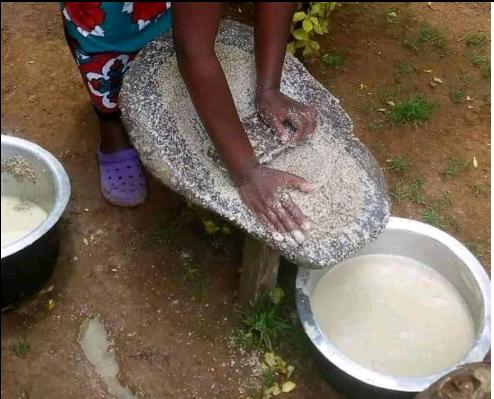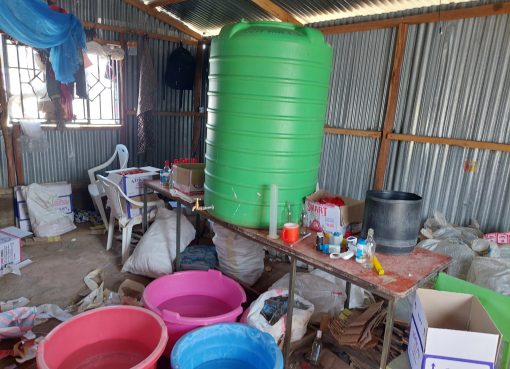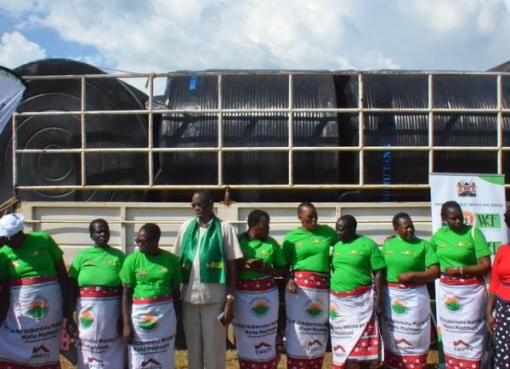Porridge was a highly treasured meal in the Ameru community such that no family would spend a day without having a cup of it.
The porridge was usually prepared by women who would grid millet using a special stone and later serve it using calabashes.
Those who could not afford porridge were considered to be weak while a woman who was not able to make porridge for the family was considered lazy and unfit in the society.
Speaking to KNA, Tabitha Acii a Seventy-Nine-year-old woman from Kathelwa village Igembe Central explained that traditionally, families could not do without porridge, a woman in the family had a duty of grinding porridge famously known as “Ucuru bwa gukia” every morning and serve it as breakfast to the entire family.
She noted that the porridge was made by mixing millet “Mwere” with small amount of water then grid using two stones the bigger one termed as ‘iiga ria Gukia’ and the small one ‘’nthie’’ that were usually made out of special stones.
Wet millets were placed on the larger stone, the smaller stone moved against the bigger one as you add little water and the time taken would depend on the person’s speed and the quantity of millet.
“I used to prepare porridge well. Sometimes I would take twenty minutes to prepare two kilograms of millets that would produce ten litres of porridge.” Tabitha maintained noting that she could prepare up to seven kilograms of millet in a day since her family was large.
“After grinding, the porridge is cooked using a steady heat while stirring constantly for around seven to ten minutes. When it becomes uniform and about to boil, the porridge is considered ready to be served.
She maintained that porridge “Ucuru bwa Gukia” never missed in important occasions such as circumcision, nursing mothers “Ntomononi” and during courtship since it was considered to give energy and power.
“Basically, we used to take porridge before beginning our daily activities more specifically tilling the lands,” she maintained.
Tabitha revealed that during circumcision period not any woman could grid porridge for the initiates unless the adult who had undergone female genital mutilation (FGM).
She expressed that the taste of porridge greatly depended on how it was prepared since some used to prepare soft one while others left rough particles known as ”makie”, chewy pieces which made porridge tasteless.
Tabitha noted that girls were trained to prepare porridge from childhood so as to become responsible wives when they get married.
Either, modern technology has become a game changer in our society where anyone can afford liquid porridge in a span of five minutes.
The tedious work of grinding porridge for hours has been compressed into a minute-work by an electric milling machine charging as low as Shs. 20 per kilogram.
On the invention of the electric milling machine, Tabitha noted that both the lazy and hardworking, those living in the rural areas where there are grinding stones and those in urban areas can access porridge due to changes brought about by technological advancements.
She added that though technology has made the process of making porridge easy, the traditional Meru stone -grinded porridge remains to be her favorite.
“The stone-grinded porridge is very sweet and can be taken sugarless unless the modern one.’’ Tabitha maintained.
Modern method of making porridge has as well created job opportunities for many people where you meet women in the streets of Maua town hawking the commodity at reasonable prices.
Alice Murugi a porridge vendor in Maua town said that she ventured into the business in 2021 to make ends meet after she lost her job due Covid-19 restrictions.
The 40-year-old single mother narrated that the business has helped her cater for her family needs as well as educate her two children.
“The business has been thriving well, I began with five litres where I made a profit of around Shs. 250 in a day. So far I sell a minimum of thirty litres meaning I pocket Shs. 1500 as a profit on a good day.” She explained.
Murugi added that a cup of porridge goes for as little as twenty shillings.
“Thanks to technology which has simplified many aspects of life. It would be very difficult to engage in such a business since the traditional method consumed a lot of time and energy in preparing porridge,” Murugi said.
By Kamanja Maeria and Edith Mwendwa





